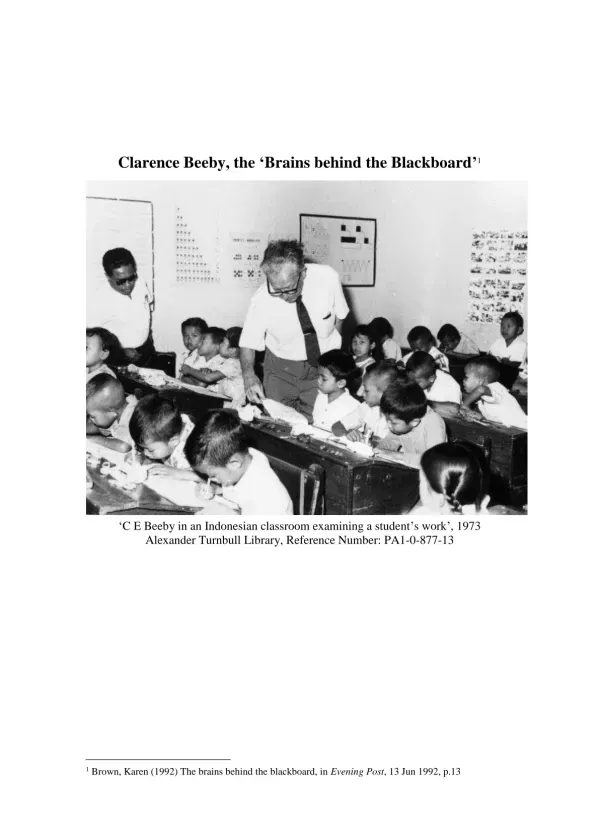
Clarence Beeby: A Philosophical Biography of Educational Reform in New Zealand
Document information
| Author | Michael Peter Couch |
| instructor | Professor Jack Copeland |
| School | University of Canterbury |
| Major | Philosophy |
| Year of publication | 2017 |
| Place | Christchurch |
| Document type | thesis |
| Language | English |
| Number of pages | 292 |
| Format | |
| Size | 2.62 MB |
- Educational Philosophy
- Biography
- New Zealand Education
Summary
I. Introduction
The biography of Clarence Beeby serves as a critical examination of educational reform in New Zealand. Beeby, known as the ‘Brains behind the Blackboard,’ played a pivotal role in shaping the educational landscape from 1940 to 1960. His tenure as Director of Education was marked by significant changes that aimed to improve the quality and accessibility of education. The document outlines Beeby's early life, his philosophical underpinnings, and the socio-political context that influenced his educational policies. The introduction sets the stage for understanding Beeby's contributions and the lasting impact of his reforms on New Zealand's education system. It emphasizes the importance of a philosophical approach to educational biography, which allows for a deeper understanding of the motivations and implications of Beeby's work.
1.1 Background of Clarence Beeby
Beeby's background is essential to understanding his educational philosophy. Born in 1902, he was influenced by the progressive educational movements of his time. His experiences as a student and later as an educator shaped his views on the role of education in society. Beeby believed in the transformative power of education and advocated for a system that catered to the diverse needs of students. His commitment to egalitarian principles is evident in his policies aimed at reducing educational disparities. The document highlights key moments in Beeby's life that reflect his dedication to educational reform, including his work with the New Zealand Council for Educational Research (NZCER) and his role in developing the New Zealand education system.
II. The Making of a Director of Education
The section delves into Beeby's ascent to the position of Director of Education, detailing the challenges and opportunities he faced. His early career was marked by a blend of administrative roles and academic pursuits, which equipped him with the skills necessary for leadership. The document discusses Beeby's philosophy of education, which emphasized the importance of a holistic approach to learning. He believed that education should not only impart knowledge but also foster critical thinking and creativity. This philosophy guided his decisions as Director, leading to the implementation of innovative programs and curricula. The analysis underscores the significance of Beeby's leadership style, characterized by collaboration and a focus on student outcomes, which set a precedent for future educational leaders.
2.1 Key Policies and Initiatives
Under Beeby's leadership, several key policies were introduced that transformed the educational landscape. The 1939 Education Report, often cited as a landmark document, laid the foundation for a more inclusive and equitable education system. Beeby's emphasis on egalitarianism and utilitarianism in education aimed to address the needs of all students, regardless of their background. The document highlights specific initiatives, such as the expansion of vocational education and the introduction of new teaching methodologies, which reflected Beeby's commitment to practical and relevant education. These policies not only improved access to education but also enhanced the quality of learning experiences for students across New Zealand.
III. Beeby s Legacy
The final section evaluates the enduring legacy of Clarence Beeby in the context of New Zealand's education system. His reforms laid the groundwork for contemporary educational practices and policies. The document discusses how Beeby's ideas continue to resonate in current educational debates, particularly regarding issues of equity and access. The analysis emphasizes the relevance of Beeby's work in addressing modern challenges, such as educational inequality and the need for a responsive education system. Notable excerpts from Beeby's writings illustrate his forward-thinking approach and commitment to continuous improvement in education. The document concludes by affirming the importance of Beeby's contributions, suggesting that his philosophical insights remain vital for educators and policymakers today.
3.1 Implications for Future Educational Reform
Beeby's legacy serves as a guiding framework for future educational reform efforts. His belief in the necessity of adapting education to meet the evolving needs of society is particularly relevant in today's rapidly changing world. The document argues that Beeby's emphasis on democratic education and social justice provides a valuable lens through which to evaluate current educational practices. By reflecting on Beeby's principles, educators and policymakers can develop strategies that promote inclusivity and foster a culture of lifelong learning. The analysis highlights the practical applications of Beeby's philosophy, suggesting that his insights can inform efforts to create a more equitable and effective education system for all students.
